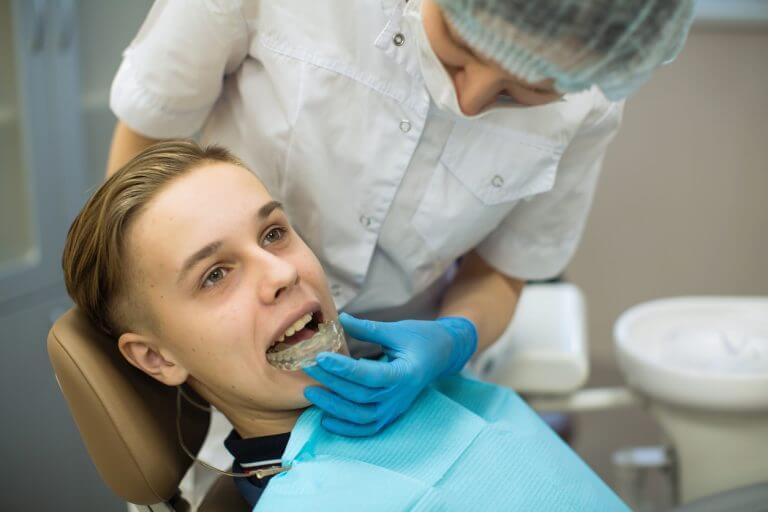What is Bruxism?
Bruxism refers to excessive teeth grinding and jaw clenching that happens during sleep. Some key facts about bruxism:
– It is an unconscious, involuntary condition where the teeth are clenched together or one is grinding their teeth against the other during sleep.
– The grinding and clenching of the teeth can occur in both the daytime and at night while sleeping. However, nighttime bruxism is considered more serious.
– Studies reveal that around 8% of children and 20% of adults experience bruxism to some extent.
– Bruxism is more common among people experiencing stress, anxiety or taking certain types of medications such as antidepressants, antihistamines or stimulants like caffeine.
Causes of Bruxism
The exact cause behind Bruxism Treatment is still unknown. However, some likely contributing factors include:
Stress and Anxiety
One of the common triggers for bruxism is periods of high stress or anxiety. Stress can cause tensing and clenching of jaw muscles even during sleep.
Genetics
Research indicates a genetic component to bruxism as well. People having family history of teeth grinding are more susceptible to developing the condition.
Sleep Position
Sleeping in a prone or lateral position where the lower jaw is tilted forwards has been linked to more occurrences of teeth grinding at night.
Medication
Certain medications like antidepressants, antihistamines, caffeine, amphetamines etc. can increase parafunctional jaw movements leading to bruxism.
Alcohol Consumption
Alcohol is known to relax muscles in the body. However, it causes teeth clenching by interfering with the sleep cycles and stages.
Symptoms of Bruxism
The signs and symptoms of bruxism may include:
– Worn, cracked, chipped or broken teeth due to excessive clenching and grinding.
– Tired, sore or painful jaw muscles, especially upon waking up.
– Jaw tenderness or discomfort, lockjaw, headaches specifically in the morning.
– Earaches as the temporomandibular joint connecting the jawbone to the skull may get strained.
– Tooth sensitivity or soft tissue pain like tongue discomfort.
– Risk of temporomandibular joint (TMJ) dysfunction due to wear and tear over the years.
Treatment Options for Bruxism
The treatment approaches for bruxism depend upon its severity and underlying causes. Some common measures include:
Mouthguards and Splints
Wearing a custom-fitted mouthguard or night guard during sleep is recommended for protecting teeth from extra wear. Some types even help relax jaw muscles.
Behavioral Modification
Stress handling techniques like meditation, yoga etc. may help reduce grinding in cases triggered by anxiety. Maintaining a healthy sleep schedule also brings relief.
Physiotherapy
Physiotherapy exercises focusing on jaw muscles along with hot or cold therapies can loosen tight muscles. Meanwhile, professional deep tissue massage helps relax muscles.
Medication
Mild muscle relaxants or other medications prescribed by the dentist may temporarily relieve symptoms in extreme cases. However, their long-term usage is not advisable.
Bite Adjustment
A night guard made specifically to balance the bite can prevent grinding by keeping teeth from fully clenching together. This reduces pressure on the teeth and jaw joint.
When Should You See a Dentist?
While mild occasional bruxism may not require treatment, it is advisable to consult a dentist if:
– Grinding is frequent and symptoms like facial or jaw pain persist.
– One notices cracked, chipped or damaged teeth especially along the biting edges.
– There is a family history of severe bruxism or TMJ disorders putting one at higher risk.
– Behavioral interventions and over-the-counter mouthguards provide no relief from symptoms.
The dentist will examine the teeth, jaw joint and mouth tissues. Depending on findings, additional tests or X-rays may help diagnose underlying issues like TMJ problems. Together, the doctor and patient can determine the best treatment approach. Early intervention often leads to faster symptom relief.
Bruxism treatment is a very common sleep related teeth grinding disorder with multiple potential triggers. While stress appears to be a major factor, genetics and certain medications could also play a role. Regular dental checkups, use of mouthguards and stress management techniques go a long way in keeping bruxism symptoms in control. Consulting a dental expert helps design an optimal treatment plan for lifestyle management and protection of oral health.
*Note:
1. Source: Coherent Market Insights, Public sources, Desk research
2. We have leveraged AI tools to mine information and compile it


